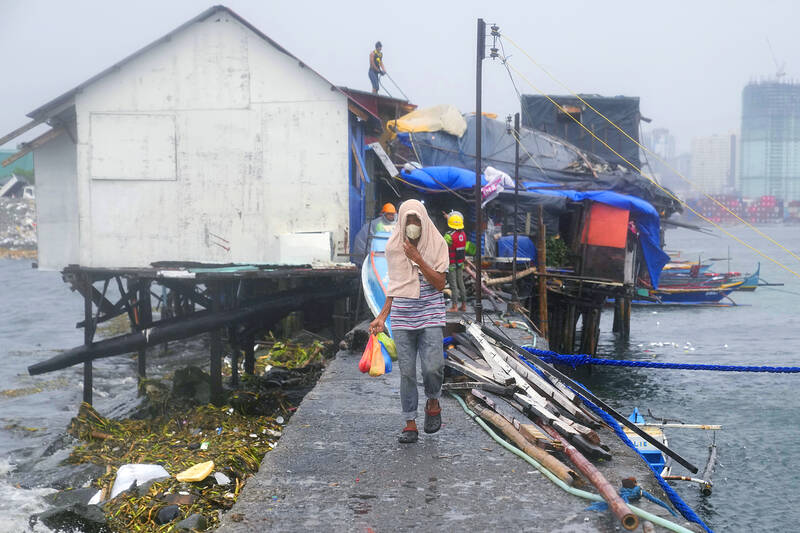A powerful typhoon shifted and abruptly gained strength yesterday as it blew closer to the northeastern Philippines, prompting evacuations from high-risk villages and the capital, which could be sideswiped by the storm, officials said.
Typhoon Noru was swirling at sea about 115km east of Infanta town in Quezon Province, with sustained winds of 195kph and gusts of up to 240kph.
While barreling toward the archipelago, Noru changed track southward, pushed down by a high-pressure area to its north. It gained considerable strength, transforming from a storm with sustained winds of 85kph on Saturday into a super typhoon just 24 hours later in an “explosive intensification” at sea, Philippine Atmospheric, Geophysical and Astronomical Services Administration head Vicente Malano said.

Photo: AP
The rapid intensification as it neared land was “unprecedented” storm behavior, weather forecaster Robb Gile said.
Thousands of villagers in Quezon Province were evacuated from the typhoon’s path, as well as from mountainside villages that are prone to landslides and flash floods, and in coastal communities that could be hit by tidal surges as high as 3m.
“The combined effects of a storm surge and high waves breaking along the coast may cause life-threatening and damaging inundation or flooding,” the weather agency warned.
In Manila’s seaside district of Tondo, some residents left their homes with bags of belongings and hurriedly walked to a nearby evacuation center as the sky darkened and rains started to fall.
Provincial disaster management head Melchor Avenilla said law enforcers were under orders to forcibly move people who refuse to leave their homes.
“So far we’ve been able to do this by just appealing to people,” Avenilla said.
The typhoon’s eye could pass about 40km to 50km from metro Manila, “which is nearly a direct hit,” Malano said.
Fishing boats and inter-island and cargo ferries were restricted to port as a precaution, the coast guard said.
Cargo trucks and more than 2,500 passengers were stranded. More than 30 flights at Manila’s airport, mostly bound for domestic destinations, were canceled.
The typhoon was forecast to sweep through Luzon Island last night and into the South China Sea today. It is on track to hit Vietnam later in the week while maintaining its powerful winds.
Noru comes nine months after another super typhoon devastated swathes of the country, killing more than 400 people and leaving hundreds of thousands homeless.
Additional reporting by AFP

TRUST: The KMT said it respected the US’ timing and considerations, and hoped it would continue to honor its commitments to helping Taiwan bolster its defenses and deterrence US President Donald Trump is delaying a multibillion-dollar arms sale to Taiwan to ensure his visit to Beijing is successful, a New York Times report said. The weapons sales package has stalled in the US Department of State, the report said, citing US officials it did not identify. The White House has told agencies not to push forward ahead of Trump’s meeting with Chinese President Xi Jinping (習近平), it said. The two last month held a phone call to discuss trade and geopolitical flashpoints ahead of the summit. Xi raised the Taiwan issue and urged the US to handle arms sales to

A magnitude 5.6 earthquake struck off the coast of Yilan County at 12:37pm today, with clear shaking felt across much of northern Taiwan. There were no immediate reports of damage. The epicenter of the quake was 16.9km east-southeast of Yilan County Hall offshore at a depth of 66.8km, Central Weather Administration (CWA) data showed. The maximum intensity registered at a 4 in Yilan County’s Nanao Township (南澳) on Taiwan’s seven-tier scale. Other parts of Yilan, as well as certain areas of Hualien County, Taipei, New Taipei City, Taoyuan, Hsinchu County, Taichung and Miaoli County, recorded intensities of 3. Residents of Yilan County and Taipei received

Taiwan has secured another breakthrough in fruit exports, with jujubes, dragon fruit and lychees approved for shipment to the EU, the Ministry of Agriculture said yesterday. The Animal and Plant Health Inspection Agency on Thursday received formal notification of the approval from the EU, the ministry said, adding that the decision was expected to expand Taiwanese fruit producers’ access to high-end European markets. Taiwan exported 126 tonnes of lychees last year, valued at US$1.48 million, with Japan accounting for 102 tonnes. Other export destinations included New Zealand, Hong Kong, the US and Australia, ministry data showed. Jujube exports totaled 103 tonnes, valued at

BIG SPENDERS: Foreign investors bought the most Taiwan equities since 2005, signaling confidence that an AI boom would continue to benefit chipmakers Taiwan Semiconductor Manufacturing Co’s (TSMC, 台積電) market capitalization swelled to US$2 trillion for the first time following a 4.25 percent rally in its American depositary receipts (ADR) overnight, putting the world’s biggest contract chipmaker sixth on the list of the world’s biggest companies by market capitalization, just behind Amazon.com Inc. The site CompaniesMarketcap.com ranked TSMC ahead of Saudi Aramco and Meta Platforms Inc. The Taiwanese company’s ADRs on Tuesday surged to US$385.75 on the New York Stock Exchange, as strong demand for artificial intelligence (AI) applications led to chip supply constraints and boost revenue growth to record-breaking levels. Each TSMC ADR represents